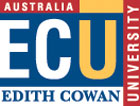PhD – Doctor of Philosophy in Engineering – Electrical and Electronic
PhD – Doctor of Philosophy in Engineering – Electrical and Electronic
Communications and Electronics Research at ECU concentrates on both fundamental and applied research to develop new technologies for next generation wireless communication systems, and environmental monitoring applications. The other major area of research includes renewable energy integration in power grids and relevant energy management techniques. Specific postgraduate research topics are…
Categories
COURSE DESCRIPTION
Communications and Electronics Research at ECU concentrates on both fundamental and applied research to develop new technologies for next generation wireless communication systems, and environmental monitoring applications.
The other major area of research includes renewable energy integration in power grids and relevant energy management techniques. Specific postgraduate research topics are developed in conjunction with the postgraduate coordinator or potential supervisor, however applications are particularly encouraged from those with an interest in: Green Communication Technologies; 5G systems and Beyond; Sensing Technologies for Environmental Monitoring Applications; Renewable Energy Integration in Power Grids; Smart Grid and Energy Management; Electric Cars and Charging Stations. Researchers in the school are currently involved in projects investigating green communication technologies for 5G systems, sensing technologies and sensor networks for environmental monitoring applications, wearable technologies for sports, the integration of renewable energy sources in power grids, renewable energy storage systems, energy management in smart grid, plug-in hybrid vehicles and charging strategies. The School boasts two research laboratories in this field (the advanced instrument and measurement laboratory and the smart energy research laboratory), with state-of-the-art equipment to facilitate high quality research.
Career Opportunities
Employment opportunities
Academia, Government Agencies, Engineering Consultancies, Research and Development, Industry
Possible future job titles
Green Communication, 5G system, Sensing Technologies, Smart Grid, Electric Cars
REQUIREMENTS
All applicants are required to have the equivalent of 6 months full time research (which must involve a research output which includes the conception and design of the project, and analysis and interpretation of findings) if applying with a Masters qualification other than a Master by Research.
Academic admission requirements (Band 11) may be satisfied through completion of one of the following:
Masters Degree (Research); or
Bachelor Honours Degree (First or Upper Second class); or
Demonstrated capacity to undertake original PhD-level research.
English competency requirements:
IELTS Academic: An overall band minimum score of 6.5, with no individual band less than 6.0.) (Results are typically valid for 2 years and online tests are not acceptable.)
TOEFL iBT: TOEFL iBT: 84 (with no score below 17)
TOEFL Paper-Based Test (PBT): Minimum score of 573, including Test of Written English of 5.0 or better. (Results are typically valid for only 2 years)
Pearson Test of English (PTE): PTE Academic 58, with no score less than 50 for postgraduate standard entry courses. (Results are typically valid for only 2 years)
EDUCATIONAL INSTITUTION
Edith Cowan University (ECU) is a large, multi-campus institution serving communities in Western Australia and internationally.ECU was awarded university status in 1991, but despite its relative youth, the University has a proud history of more than a century of service to education in Western Australia and is recognised for its teaching and learning, excellence in research, and partnerships with the community.We have more than 23,300 students, including around 18,500 undergraduates and 4,800 postgraduates. Approximately 3,600 international students attend the University, originating from 104 countries.We are a progressive University with courses developed through ongoing industry input, and employing lecturers who engage fully with their students. We’re a university that knows while knowledge is important, understanding comes from experience –experience that enables you to adapt what you’ve learned to whatever opportunities come your way. Because that’s when you do more than just survive in this world. You thrive in it.




